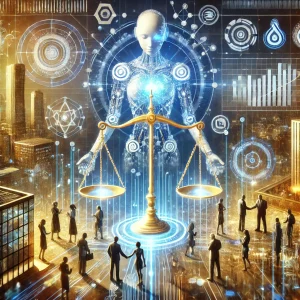Etihical and moral principle in the development and applivition artificial intelligence

By Dr. Abdul Wadud Nafis, LC., MEI
Artificial intelligence (AI) has become a technological revolution that is transforming how we live, work, and interact with the world around us. From autonomous vehicles cruising on highways to medical systems that can diagnose diseases with extraordinary accuracy, the potential of AI is limitless. However, behind its sophistication and grandeur, there are profound questions that demand our attention—how should this technology be controlled? Are we truly ready to hand over some control of our lives to machines?
Ethical and moral principles in the development and application of artificial intelligence are not just an afterthought to be considered later; they are the foundation that will determine whether AI will become an empowering tool for humanity or a threat that destroys the social order. Justice, transparency, accountability, and privacy protection—these are not mere jargon but fundamental principles that must be upheld in every step of AI development and application.
As humans, we are faced with a major dilemma: to harness the immense power of AI to improve the quality of life while still preserving the core human values we hold dear. If we fail to ensure that this technology is used ethically and responsibly, we not only jeopardize our own future but also the future of generations to come. Therefore, it is our role as developers, regulators, and users of this technology to ensure that artificial intelligence is not only smart but also wise.
Ethical and moral principles in the development and application of AI play a very important role in ensuring that this technology is used responsibly, fairly, and for the benefit of society. Artificial intelligence, with all its potential and capabilities, can bring many benefits. However, it also raises ethical challenges that need to be addressed, given its autonomous ability to make decisions and process large amounts of data. Therefore, it is crucial for developers and users of this technology to pay attention to ethical and moral principles that guarantee AI’s safe and beneficial use.
Justice and equality are fundamental principles in the development and application of AI. AI systems must be designed in such a way that they can be used fairly without discrimination against any group. This includes efforts to avoid bias in data that could lead to unfair decisions, such as in recruitment or loan systems. Furthermore, this technology must ensure equal access for all, regardless of social, economic, or geographical status, so that the digital divide does not widen.
Transparency is another critical consideration in AI development. Users must be able to understand how AI systems work and how decisions are made. This clarity is essential, especially in sensitive applications such as healthcare or law, where AI’s decisions must be clearly explained to those involved. This openness must also include information about the algorithms used and the potential risks associated with the system’s usage.
Accountability is another principle that must be maintained in the use of AI. Developers and organizations that implement AI systems must be accountable for the decisions made by these technologies. For example, if AI causes harm or errors, there must be a clear mechanism for accountability. Additionally, it is important to ensure that AI systems can be regularly audited to guarantee that their implementation remains in line with ethical standards.
Privacy and data protection are also principles that must not be overlooked. AI systems rely heavily on personal data, so privacy protection is crucial to maintaining user trust. Users must be clearly informed about what data is collected, how it is used, and how it is protected from misuse. Data security must be a top priority in every AI application to prevent the leakage of personal information that could harm individuals.
Security and safety are other key concerns in AI development. AI systems must be designed to be reliable and safe, considering the potential risks that arise if errors or manipulations occur. AI systems used in critical contexts, such as autonomous vehicles or medical devices, must function properly and not pose risks to users. Additionally, these systems must be capable of protecting themselves from potential attacks or manipulations that could lead to harm.
The principle of human control and autonomy should also be considered in AI development. Although AI can make decisions automatically, humans must retain control over critical decisions made by these systems. Decisions that directly impact human lives, such as medical or legal decisions, must remain under human supervision. AI should function as a supportive tool in decision-making, not replace humans in crucial situations.
The goodness or benefit for humanity must be the primary goal in the use of artificial intelligence. AI can be used to address major challenges, such as health issues, climate change, and poverty. Developers of this technology must ensure that its application will bring positive impacts for human well-being. On the other hand, potential harms or negative impacts must also be minimized to ensure that this technology does not create injustices or harm certain parties.
Sustainability should also be considered at every stage of AI development and application. This technology must be developed with consideration for its impact on the environment and society in the future. Efficient energy use and efforts to reduce the carbon footprint of AI systems are examples of sustainability principles that need to be applied. Furthermore, AI developers must consider the long-term impacts of this technology on future generations, ensuring it does not cause irreversible damage or inequality.
Finally, the principle of respect for human rights must not be ignored. AI must always be developed and used with a focus on human values, respecting the dignity of each individual. AI systems must not be used to exploit or abuse power over any group. Instead, this technology should aim to strengthen and protect individual rights and provide benefits equally to all segments of society.
Overall, ethical and moral principles in the development and application of artificial intelligence are crucial to ensure that this technology is used wisely. Justice, transparency, accountability, privacy, safety, and respect for human rights should serve as the guiding principles in every step of AI development. By upholding these principles, we can ensure that artificial intelligence will bring great benefits to humanity without causing unintended negative impacts.
In the face of rapid technological advancements, artificial intelligence (AI) stands at the forefront of the digital revolution, offering the promise of profound changes in human life. However, behind this tremendous potential lies a significant challenge: how to ensure that AI, despite being sophisticated and innovative, remains on the path of ethical and moral conduct? Artificial intelligence is not just about speed or efficiency; it’s about how this technology can enrich human life, not destroy it.
In facing this new era, ethical and moral principles are pillars that cannot be ignored. The decisions made by AI systems must reflect the human values we uphold, such as justice, transparency, and accountability. Only by enforcing these principles can we ensure that artificial intelligence will serve the interests of not just a few, but will provide widespread and equitable benefits to all of humanity.
As the world increasingly relies on AI to make major decisions, we are confronted with an important choice: will we allow machines to control our lives, or will we take control wisely, ensuring that this technology remains a tool that brings good, not a threat? This is the moment for us to set a strong foundation for the development and application of AI, ensuring that technological progress does not sacrifice the ethical and moral principles that have guided humanity for centuries. In this way, we will enter a new era that is not only advanced in technology but also wise in human values.
References
1. Binns, R. (2018). Ethics in Artificial Intelligence: A Framework for Thinking About the Ethical Implications of AI. Oxford University Press.
2. Bryson, J. J., & Winfield, A. F. (2017). Standardizing Ethical Design for Artificial Intelligence and Autonomous Systems. Computer Science and Engineering, 16(3), 79-95.
3. Floridi, L., & Cowls, J. (2019). A Unified Framework of Five Principles for AI Ethics. Harvard Data Science Review, 1(2), 1-16.
4. Gunkel, D. J. (2018). Robot Rights. MIT Press.
5. Hagendorff, T. (2020). The Ethics of Artificial Intelligence. Springer Nature, 5(3), 75-92.
6. He, H., & Zhang, Y. (2020). Artificial Intelligence and Ethics: Principles, Guidelines, and Models. IEEE Transactions on Artificial Intelligence, 6(2), 201-215.
7. Moor, J. H. (2006). The Nature, Importance, and Difficulty of Machine Ethics. IEEE Intelligent Systems, 21(4), 18-21.
8. O’Neil, C. (2016). Weapons of Math Destruction: How Big Data Increases Inequality and Threatens Democracy. Crown Publishing Group.
9. Russell, S., & Norvig, P. (2016). Artificial Intelligence: A Modern Approach (3rd ed.). Pearson Education.
10. Véliz, C. (2020). Privacy Is Power: Why and How You Should Take Back Control of Your Data. W.W. Norton & Company.
11. Winfield, A. F. (2019). Ethics and Artificial Intelligence: A Fundamental Look at AI, Ethics, and Responsibility. Springer.
12. Yudkowsky, E. (2008). Artificial Intelligence as a Positive and Negative Factor in Global Risk. In Global Catastrophic Risks (pp. 303-345). Oxford University Press.

